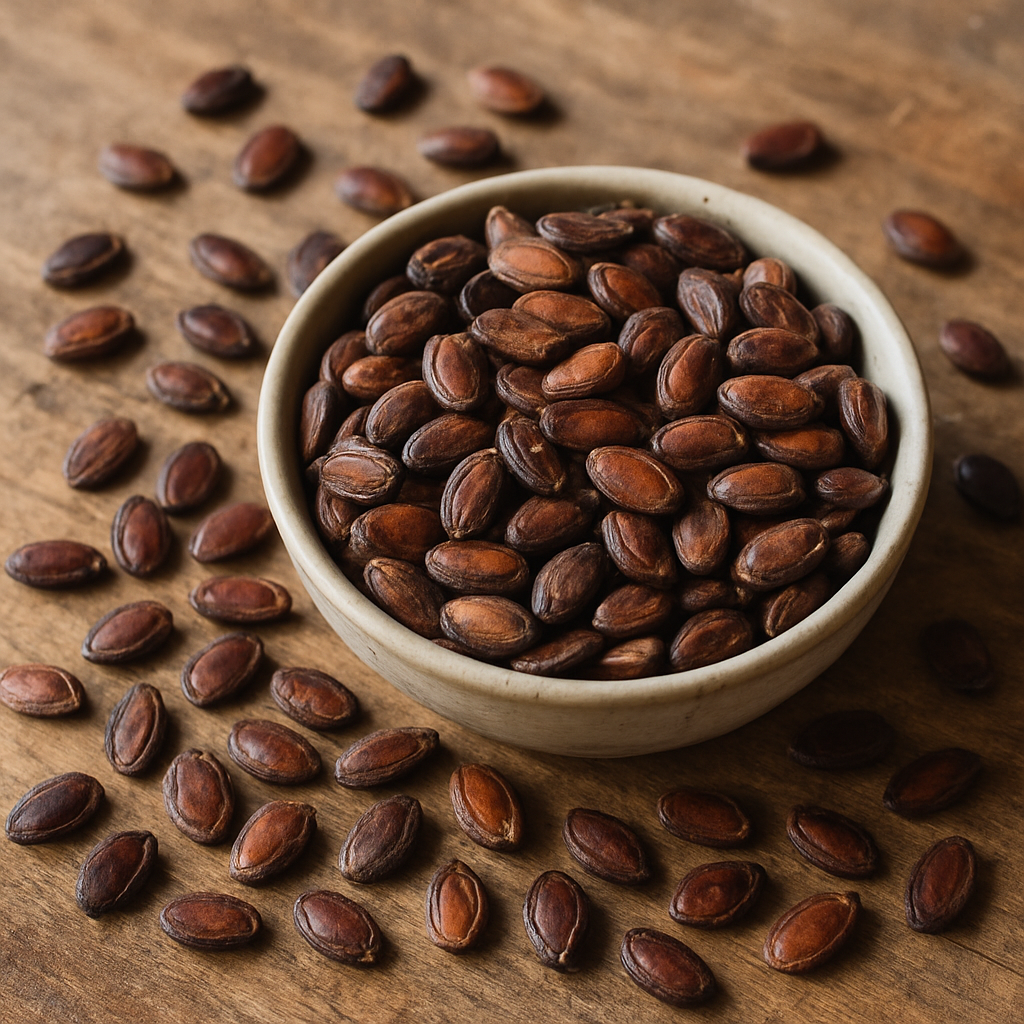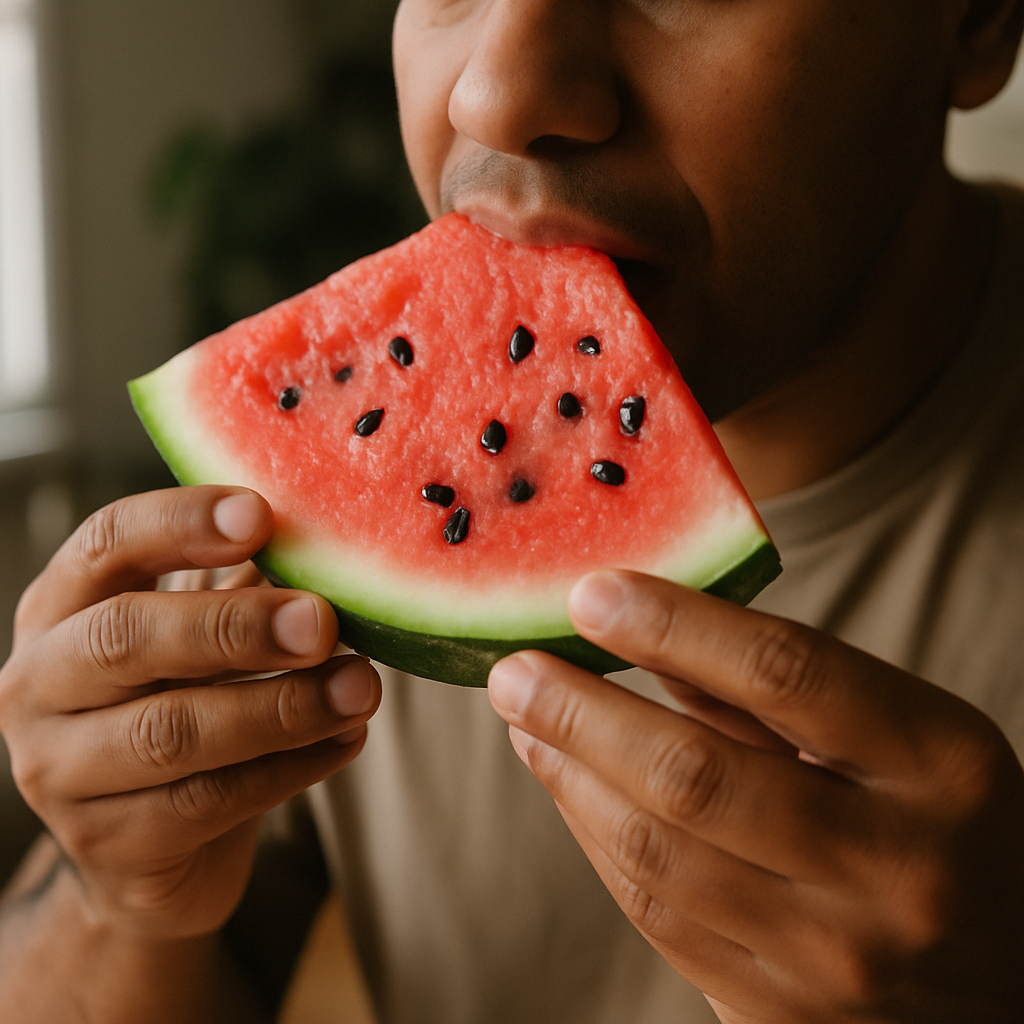Ask Ayurvedic doctor a question and get a consultation online on the problem of your concern in a free or paid mode. More than 2,000 experienced doctors work and wait for your questions on our site and help users to solve their health problems every day.
How to Consume Watermelon Seeds: Ayurvedic Guide to Benefits and Safe Use

Most people spit them out without thinking. But if you’ve ever wondered how to consume watermelon seeds or whether eating watermelon seeds can actually be good for you, you’re not alone. Ayurveda, the ancient system of Indian healing, has long highlighted the hidden nutritional value in these tiny black or white seeds. While some dismiss them as just annoying extras inside the fruit, they’re actually a powerful source of nutrients when used properly. Learning how to eat watermelon seeds—whether raw, roasted, or blended into a recipe—can unlock benefits you didn’t expect.
In this article, we’ll explore the Ayurvedic perspective on watermelon seeds, covering the best time to eat watermelon seeds, the best way to eat watermelon seeds, and even simple watermelon seeds recipes you can try at home. By the end, you’ll see why it’s time to rethink tossing them away.

How to Consume Watermelon Seeds for Health
Watermelon seeds are small, yes, but don’t underestimate them. They’re rich in magnesium, zinc, iron, healthy fats, and protein. From an Ayurvedic lens, these seeds balance pitta (heat in the body) and provide cooling energy, especially when consumed in summer.
But it’s not enough to just chew a few randomly—you need to know the right ways to prepare and consume them for maximum effect. Let’s break down the options.
How to Eat Watermelon Seeds Raw or Roasted
You can eat watermelon seeds raw, but it’s not the most enjoyable experience. The outer shell can feel a bit tough, and your digestive system might struggle with them if not chewed properly. Ayurveda usually recommends soaking them first—this softens the shell and makes digestion smoother.
For most people though, the best way to eat watermelon seeds is roasted. Lightly roasting them brings out a nutty, crunchy flavor similar to sunflower or pumpkin seeds. Sprinkle a bit of salt or mild spices, and suddenly you’ve got a healthy snack that doesn’t feel like health food at all.
Roasted watermelon seeds are not just tasty—they’re convenient. You can keep them in a jar and grab a handful when hunger strikes, rather than reaching for chips or candy.
Best Time to Eat Watermelon Seeds
Ayurveda often emphasizes timing. The best time to eat watermelon seeds is generally during the day, ideally as a mid-morning or mid-afternoon snack. This is when your digestion (or agni) is strongest, which helps absorb all the nutrients efficiently.
Some also suggest consuming them after a workout because the protein and minerals help muscle recovery. Eating them late at night isn’t ideal; seeds can be slightly heavy and may interfere with sleep if your digestion is already slowing down.
How Much Watermelon Seeds to Eat Daily
Moderation is key. A common mistake is assuming that more seeds equal more benefits. In reality, Ayurveda suggests balance. About 1–2 tablespoons of watermelon seeds daily is enough for most adults. That’s roughly a small handful—enough to give you magnesium and good fats without overloading your digestive system.
If you overdo it, you might feel bloated or heavy. Remember, they’re nutrient dense, not empty calories. Listen to your body; if it feels like too much, scale back a little.

Don't wait or self medicate. Start chat with Doctor NOW
Benefits of Eating Watermelon Seeds in Ayurveda
So why bother with these little seeds anyway? Ayurveda has a clear answer: they nourish both body and mind. According to Ayurvedic texts, watermelon seeds carry a sheetal (cooling) quality, which helps calm excessive body heat, reduce inflammation, and support the urinary tract. They’re also known to be mildly diuretic, assisting the body in flushing out toxins through urine.
From a modern nutrition perspective, eating watermelon seeds benefits your body in multiple ways:
-
Heart health: Thanks to magnesium and healthy fatty acids.
-
Better digestion: Fiber helps regulate bowel movement.
-
Energy boost: Seeds provide plant-based protein, which can be useful for vegans and vegetarians.
-
Skin & hair: Zinc and iron in the seeds are known to support clearer skin and stronger hair.
It’s interesting how Ayurveda and modern science seem to shake hands here. Both agree that eating them in moderation is highly beneficial.
Best Ways to Prepare and Use Watermelon Seeds
If you’re curious about the best way to eat watermelon seeds, the preparation matters as much as the act of eating. Ayurveda recommends processing seeds in ways that make them light, digestible, and flavorful. Let’s look at some practical methods.
Roasted Watermelon Seeds: Healthy Snack Option
Roasting is probably the easiest and most popular choice. Simply take soaked and dried seeds, place them on a pan, and roast over low heat. Don’t rush—if the heat is too high, the seeds can burn quickly and lose their nutrients.
Once roasted, you can sprinkle a bit of rock salt, cumin powder, or even chili flakes for a tasty twist. Some people like to drizzle a drop of ghee (clarified butter) for extra Ayurvedic goodness, but that part is optional.
The beauty of roasted watermelon seeds is their versatility. You can eat them straight, mix them into trail mix, or add them as a crunchy topping to salads. They are portable, shelf-stable, and frankly just fun to munch on.
Watermelon Seeds Recipe for Smoothies and Desserts
Here’s where things get creative. If the idea of chewing seeds doesn’t appeal to you, grinding them into powder is a brilliant workaround. Once powdered, the seeds can be added to smoothies, shakes, or even healthy desserts.
Quick recipe idea:
-
Take 1 tablespoon of roasted watermelon seeds.
-
Grind into fine powder.
-
Add to a banana smoothie with almond milk and a drizzle of honey.
This not only adds nutrition but also gives the smoothie a slightly nutty undertone.
Another Ayurvedic-inspired watermelon seeds recipe is using the powdered seeds in kheer (a traditional Indian rice pudding). Just stir a spoonful into the milk as it simmers—this thickens the texture and adds minerals.
If you love baking, you can also sprinkle the seeds on top of muffins, granola bars, or bread before putting them in the oven. They toast beautifully and give a rustic look to your dish.
Precautions and Side Effects of Eating Watermelon Seeds
While eating watermelon seeds benefits your health in many ways, moderation is still the golden rule. Ayurveda reminds us that even the healthiest foods can become harmful if consumed in excess or without proper awareness.
Some potential things to watch out for:
-
Digestive strain: Eating too many whole seeds without soaking or roasting may lead to bloating or constipation.
-
Calorie density: Seeds are nutrient-rich, but they’re also calorie-dense. If you’re trying to manage weight, don’t go overboard.
-
Allergies: Rare, but possible. If you notice itching, stomach upset, or any unusual symptoms, stop and check with a doctor.
Pregnant women should be cautious. Though generally safe, it’s always best to consult a healthcare provider before adding anything new in larger amounts. Kids too should have smaller portions — their digestion is more delicate.
In other words, enjoy them, but listen to your body.
Conclusion
So, what’s the bottom line? Watermelon isn’t just about the juicy red flesh we all crave in summer. Its seeds—often discarded—carry a hidden world of nutrition that Ayurveda has praised for centuries. Whether you learn how to eat watermelon seeds raw, or you prefer the crunch of roasted watermelon seeds, there are many ways to include them in your diet.
To recap quickly:
-
The best time to eat watermelon seeds is during the day, when your digestion is strongest.
-
The best way to eat watermelon seeds is roasted or powdered, so they’re easier to digest.
-
Stick to about how much watermelon seeds to eat daily: one to two tablespoons for adults.
-
Explore different watermelon seeds recipes to keep things exciting.
They may be small, but these seeds are mighty. Try keeping a jar handy on your kitchen counter—you’ll be surprised how fast you start reaching for them as a healthier alternative to processed snacks.
And if you found this helpful, why not share it with someone who still spits out every seed? You might just change their mind (and their health) for the better.
FAQs
What are the benefits of eating watermelon seeds?
Watermelon seeds provide magnesium, zinc, protein, and healthy fats. In Ayurveda, they balance body heat, support digestion, and improve urinary health. Modern nutrition adds benefits for heart, skin, and hair.
How many watermelon seeds should I eat daily?
For most adults, 1–2 tablespoons daily is enough. That gives you the nutrients without straining digestion. Eating too many at once might cause discomfort.
Are roasted watermelon seeds healthier than raw ones?
Both raw and roasted seeds have nutrients, but roasted watermelon seeds are easier to digest and taste better. Ayurveda often favors lightly processed foods (like soaking or roasting) to unlock the goodness inside.

